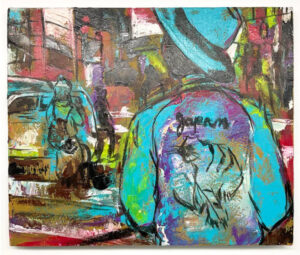

When Sunny Choi takes to the floor and hits her flow, she becomes more than a dancer. She becomes motion. Memory. Music. Flying, floating, free — that’s how she describes the visceral sensation of breaking, the street-born dance form that carried her from the linear track of Ivy League ambition to the dazzling spiral of the Olympic Games in Paris 2024.
But for Choi, the journey to that global stage was never just about medals or accolades. It was about escape — and then, miraculously, about choosing not to escape anymore.
The Unexpected Path from Ivy League to the Cypher
To understand Sunny Choi’s story, you need to know where it didn’t begin: in a dance studio or under the tutelage of a lifelong coach. Her roots are in books, in classrooms, in carefully calibrated goals. She grew up excelling in gymnastics and piano, earning straight As, and dutifully following the roadmap of a model student. She attended an Ivy League school, landed a high-level corporate job, and bought into the trappings of success: a home, a plan, a future lined up like chess pieces.
And yet, beneath all of that order, she was in search of something chaotic, alive, and undefined. A means of escape. As a child, she consumed stories not to learn about others, but to imagine being someone else entirely. Magazines were picture books. Music was a portal.
“I wanted to escape the pressures of society,” Choi writes. “All the while, I was going through the motions of being a picture of success.”
That all changed in college, when she stumbled upon breaking — first out of curiosity, then compulsion. She didn’t see it coming. No one did. But there was something about the raw energy of the dance, the resistance it offered to structure and conformity, that drew her in.
Breaking as Liberation
Breaking, born in the Bronx during the early 1970s, is more than a dance. It is resistance turned into rhythm. It is poetry composed with bodies. It is discipline meeting improvisation at breakneck speed.
For Choi, who had trained her mind to overachieve and her body to obey, breaking felt like liberation.
“In those moments when I get into a flow state and just be,” she explains, “I cease to exist and become one with the music and energy. Yet, I’m also the most me — free of the expectations of society, free of my own judgment.”
There is no syllabus in breaking. There are no clear rules. You crash, and if you’re lucky — if you’re open — you turn the crash into something new. And that’s the metaphor Choi has carried with her far beyond the dance floor: the failure that becomes the feature, the misstep that sparks reinvention.
Paris 2024: Breaking onto the World Stage
When breaking made its Olympic debut at the 2024 Summer Games in Paris, it marked a seismic shift in the cultural legitimacy of the art form. For the first time, a street-born, community-driven dance created by Black and Latino youth was stepping into the most institutionalized arena in sports.
For Choi, representing the United States on that stage wasn’t just about athletic achievement. It was about bringing her full story into the light — her Korean-American heritage, her academic past, her artistic present, her whole self. She stood for more than just technical execution. She stood for transformation.
“Being on that stage, representing the birthplace of hip hop, was everything,” she says. “But more than that, I realized I wasn’t looking to escape anymore. I loved my life and the person I’d become.”
Finding Community in the Cypher
One of the cornerstones of breaking is the cypher — a circular gathering of dancers, each taking turns showcasing their moves, but also feeding off one another’s energy. It’s part performance, part communion.
For someone like Choi, whose early years were marked by solitude and high expectations, the cypher offered something she hadn’t even realized she needed: community.
“There’s this radical kind of support that exists in breaking,” she reflects. “You show up as you are, and the circle holds you.”
This sense of belonging wasn’t just about movement — it was about mentality. The breakers she trained with celebrated individuality over perfection, evolution over rigidity. Mistakes weren’t shamed; they were studied and transformed. It was a space where failure could be creative.
This is where Choi learned her most important lesson: that she didn’t have to earn her worth through performance. She was always enough.
From Fear to Flow: Redefining Success
In Western culture — particularly in elite academic and corporate settings — success is often measured by predictability, control, and prestige. You don’t take a leap unless you know exactly where you’ll land.
Breaking obliterates that mindset.
Choi describes the moment when she first pulled off a “crash-to-glory” move — one that went sideways, but turned into something more dynamic than she’d intended. She remembers the crowd’s roar, the adrenaline rush, the feeling of surprise at her own resilience.
That moment crystallized her shift: “I’ve learned to overcome my fear of failure and see life as a series of lessons.”
Today, she carries that philosophy into every aspect of her life — not just the dance. Whether training for international competition, working on creative projects, or simply navigating the chaos of everyday life, she moves with curiosity rather than control.
Partnership with Nike: Movement as Message
As part of her journey to Paris and beyond, Choi partnered with Nike, a brand long known for championing athletes whose stories defy traditional arcs. For Choi, this was more than a sponsorship. It was an alignment of values.
Nike’s “Own the Floor” campaign positioned her not just as an Olympian, but as a storyteller — someone whose body speaks volumes, whose presence opens doors, and whose journey reframes what athleticism can look like.
In a behind-the-scenes video released ahead of the Games, Choi speaks candidly about doubt, reinvention, and self-love. She talks about crying after difficult competitions, about feeling like an imposter in both the dance world and the corporate one. And she talks about the breakthrough — the quiet voice inside that finally said, you belong.
Through Nike, she was able to expand her message to a new audience: young people navigating systems not built for them, searching for a way to be on their own terms.
A Living Example of Possibility
Today, Sunny Choi is more than a breakdancer. She’s a cultural bridge. An embodiment of dualities — Korean and American, academic and artistic, disciplined and wild. Her life is proof that reinvention doesn’t have to mean discarding who you were. It can mean integrating every part of you into something that flies, floats, and feels free.
She still trains with rigor. She still journals after every session. She still returns to books and music when she needs perspective. But she no longer lives by the metrics of others.
She lives by flow.
“I’ve discovered that sometimes the greatest thing we can do is simply give ourselves permission,” Choi says. “Permission to try. Permission to fail. Permission to take up space.”
Impression
As breaking continues to gain global recognition, there’s a risk of it being absorbed, sanitized, and stripped of its roots. Choi knows this — and she is vocal about honoring the culture’s origins, giving credit to its founders, and keeping its community-based ethos alive.
She uses her platform not just to shine, but to signal. To let others know that their detours, their breakdowns, their crashes — all of it can be turned into something powerful.
For Sunny Choi, the journey through breaking has been nothing short of spiritual. It brought her back to herself, over and over again. And while the Olympic medals, the brand partnerships, and the global acclaim are all remarkable, they are not the endpoint.
No comments yet.








